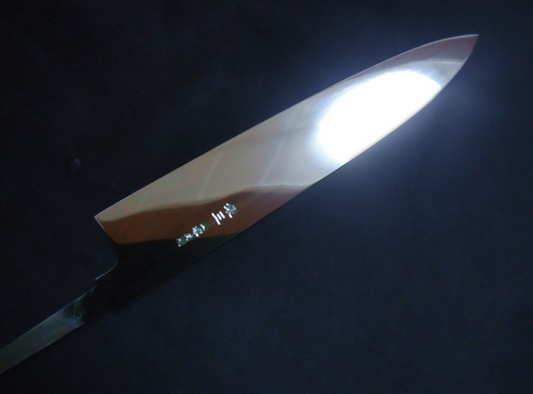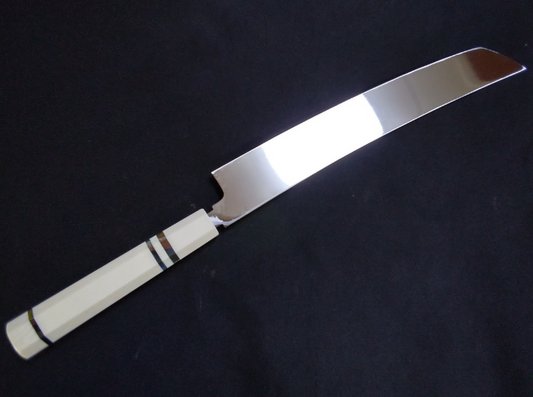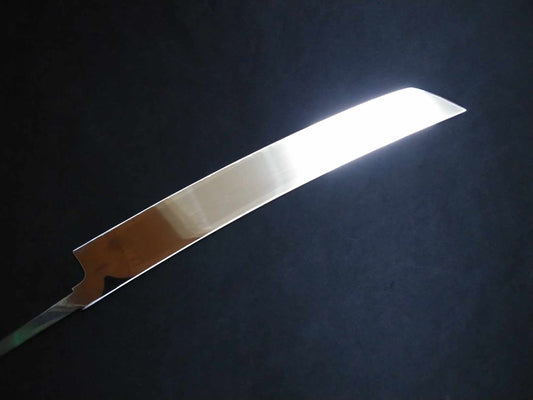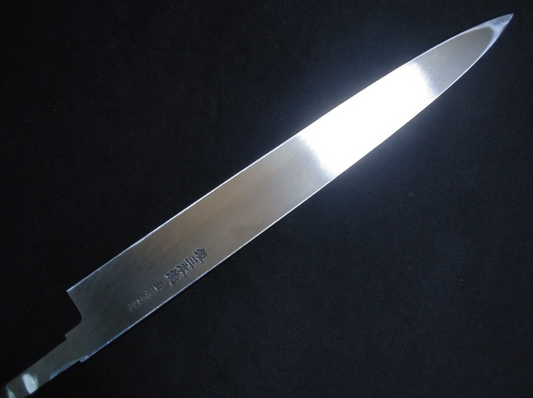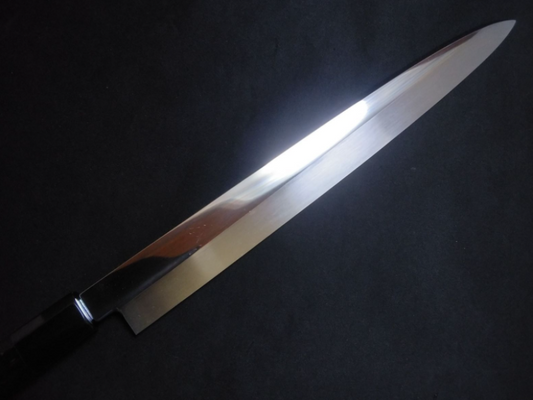
Ginsan (Honyaki)
-
Where tradition meets modern mastery.
Forged from Ginsan stainless steel using the revered Honyaki method, this blade carries the soul of Japanese sword-making—yet embraces the convenience of modern stainless steel.
It delivers the razor-sharp precision of carbon steel, with the rust resistance and easy care professionals need every day.
Long-lasting, effortless to sharpen, and built for performance, it turns every cut into a statement of skill.This is not just the next step in Honyaki—it’s the evolution that chefs around the world have been waiting for.
-
-
Ginsan (Honyaki) Gyuto 240mm -Mirror Polished(both sides)
Regular price $800.00 CADRegular priceUnit price / per$655.00 CADSale price $800.00 CADSold out -
Ginsan (Honyaki) Yanagiba (Sakimaru) 270mm -Mirror Polished(both sides)
Regular price $960.00 CADRegular priceUnit price / per$685.00 CADSale price $960.00 CAD -
Ginsan (Honyaki) Yanagiba(Sakimaru) 300mm -Mirror Polished(both sides)
Regular price $1,000.00 CADRegular priceUnit price / per -
Ginsan (Honyaki) Yanagiba 270mm -Mirror Polished (one side)
Regular price $1,080.00 CADRegular priceUnit price / per -
Ginsan (Honyaki) Yanagiba 300mm -Mirror Polished (one side)
Regular price $1,130.00 CADRegular priceUnit price / per
Traditional craftsmen working on this collection
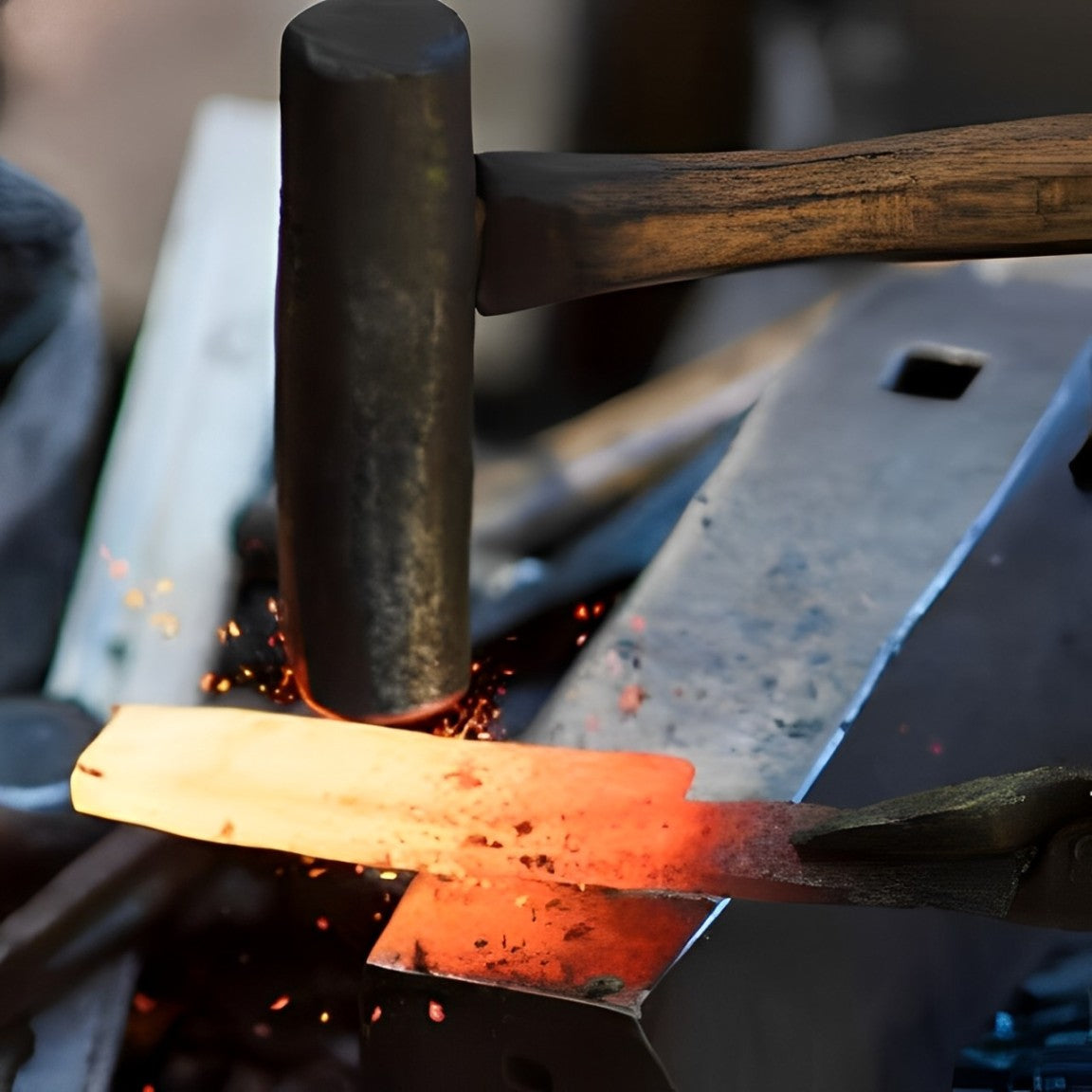
Shogo Yamatsuka
Japanese Knife Ginsan Craftsmanship
- Mr. Yamatsuka began his career as a blacksmith in 1974, and in 2012, he was recognized as a traditional craftsman with excellent forging skills in the Sakai blade-making sector.
- He is a craftsman in Sakai, rare for his mastery of Ginsan steel.
- Building on the rust-resistant Ginsan forging techniques learned from his father, he is always aiming to improve his skills.
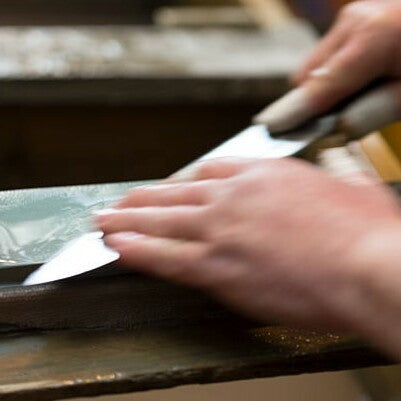
Tadayoshi Yamatsuka
Master of Japanese Knife Mirror Polishing
- Mr. Yamatsuka was recognized as a traditional craftsman in 2022.
- Excelling in blade sharpening skills, especially for thin blades
- Renowned in Sakai for his mirror polished technique on Japanese knives.
KIREAJI's Three Promises to You
-

1. Forged in the Legacy of Sakai
From Sakai City—Japan’s renowned birthplace of professional kitchen knives—each blade is crafted by master artisans with over six centuries of tradition. Perfectly balanced, enduringly sharp, and exquisitely finished, every cut carries the soul of true craftsmanship.
-

2. Thoughtful Care for Everyday Use
Every knife includes a hand-fitted magnolia saya for safe storage. Upon request, we offer a complimentary Honbazuke final hand sharpening—giving you a precise, ready-to-use edge from day one.
-

3. A Partnership for a Lifetime
A KIREAJI knife is more than a tool—it is a lifelong companion. With our bespoke paid aftercare services, we preserve its edge and beauty, ensuring it remains as precise and dependable as the day it first met your hand.
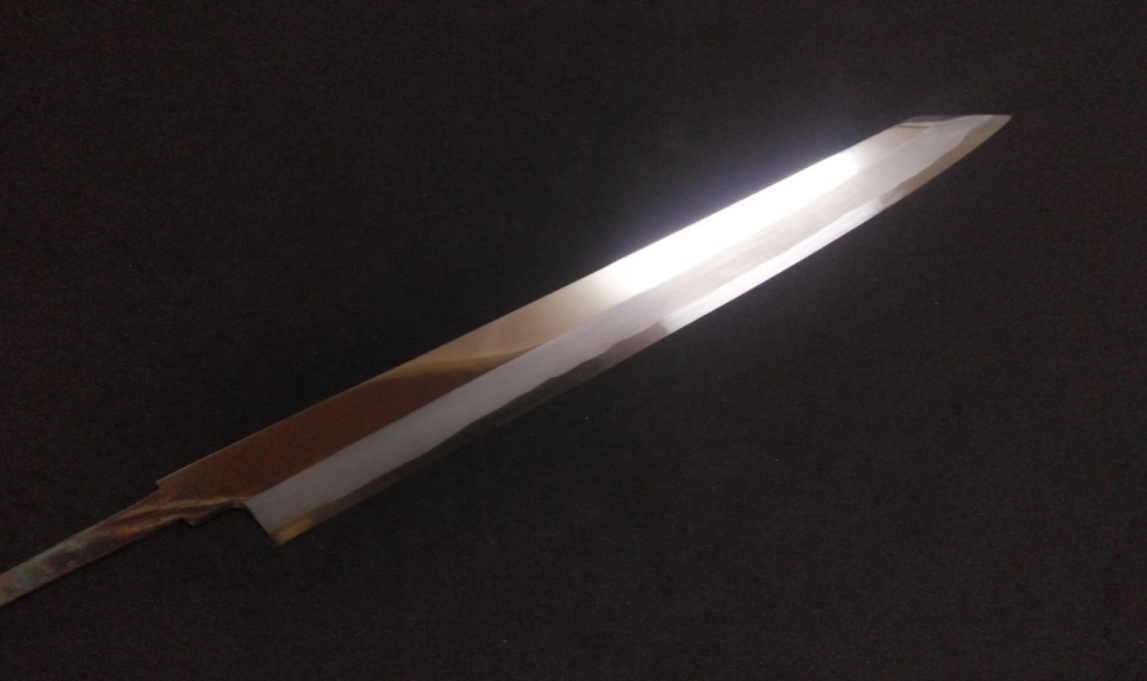
Why Many Product Photos Show Only the Blade
At KIREAJI, every knife is made to order in Sakai, Japan. Photos show the blade before the handle is attached, allowing artisans to perfect the balance and edge for your specific order. Your knife arrives fully finished — tailored just for you.

Global Delivery from Sakai
Across the world, discerning cooks seek authentic Japanese knives from Sakai — Japan’s legendary knife-making city with over 600 years of tradition.
At KIREAJI, we work alongside master artisans in Sakai to fulfill that desire, shipping genuine handcrafted knives directly from the workshop to kitchens worldwide.
Ginsan (Honyaki) — Stainless Purity, Traditional Discipline
-
This is not just a knife — it is a commitment.
Ginsan (also called Gingami No.3 / Silver-3) is a stainless tool steel formulated with about 13–14.5% chromium and ~1% carbon, engineered to deliver corrosion resistance while keeping a carbon‑steel‑like edge feel. In Honyaki construction—mono‑steel forged and hardened by traditional practice—Ginsan becomes a blade that blends classic control with modern practicality.
-

What Ginsan Really Is
Unlike many high‑carbide stainless steels, Ginsan is fine‑grained and relatively simple in alloying, which helps it take a keen edge and sharpen more easily (many chefs find it easier than VG‑10) while still resisting rust in daily use. It remains stainless—not maintenance‑free—so normal wipe‑dry care is expected.
-
What “Honyaki” Means
Honyaki denotes a mono‑steel blade hardened by traditional heat treatment—distinct from laminated constructions. In Sakai, Honyaki is considered a pinnacle build for precision and finish, produced in small numbers by specialists. (Stainless Honyaki exists; several Sakai makers offer Ginsan Honyaki lines.)
-

Why Many Smiths Choose Air Quenching for Ginsan
The steelmaker’s data sheet for GIN™3 (Ginsan) lists quench at 1000–1050 °C with air cooling (oil cooling). For mono‑steel Honyaki blades, air quenching helps reduce cracking/warpage risk and improve consistency versus more severe quench media—critical when post‑quench correction is nearly impossible. (Makers may also use fixtures/plates to control cooling on air‑hardening steels.)
-
How It Performs
- Clean, controlled cuts that preserve texture in fish, vegetables, and meats.
- Edge life suited to long prep while avoiding the “harsh” feel some high‑carbide stainless steels can exhibit.
- Practical for busy services: stainless convenience with classic single‑steel feedback.
-
The Sharpening Experience
Ginsan responds predictably on whetstones. Maintain stable angles and light, even pressure; it raises sharpness efficiently without demanding ultra‑aggressive abrasives. Routine care (wipe, dry, occasional oil on the handle/bolster wood) keeps performance consistent.
-
Who Should Choose This Knife
- Cooks who want mono‑steel tradition (Honyaki) with stainless practicality.
- Professionals who value precise feedback and consistent edge life through long shifts.
- Users who enjoy sharpening but prefer less worry about rust.
-
Who Should Consider Other Options
- Those who want minimal maintenance above all (fully stainless laminated builds, etc.).
- For heavy, rough tasks — such as working with bones or hard materials — consider a more rugged option.
-
Ginsan. Honyaki.
A stainless Honyaki that carries tradition into daily service—clean, confident, and made to work.
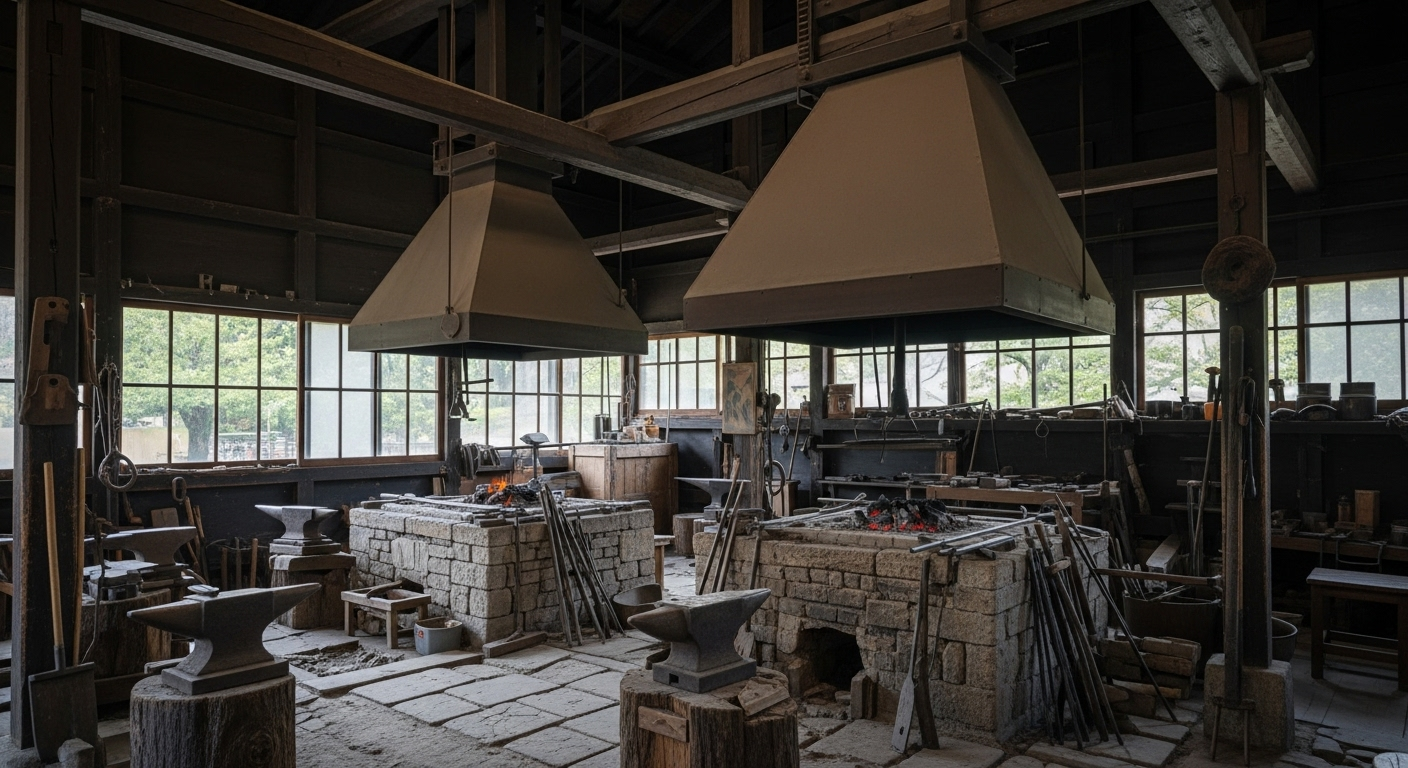
Why Ginsan Honyaki Uses Air Quenching — A Decision Forged in Science and Tradition
-
A great knife is more than sharpness.
It is the sum of every decision made in its creation — and in the case of Ginsan (Honyaki), one of the most crucial choices happens in the heat of the forge: air quenching.
-
Quenching — The Moment of Truth
In heat treatment, steel is heated to a high temperature, then cooled quickly to form martensite — a hard, fine-grained structure that gives the blade its strength, wear resistance, and edge life.
But speed alone is not the goal.
Cool it too fast, and the blade may crack.
Cool it too slowly, and it may never reach full hardness.
Precision is everything. -

Why Air Quenching Works Perfectly for Ginsan
Ginsan is a high-chromium stainless steel with exceptional hardenability — meaning it can fully transform into martensite even with slower cooling. This allows skilled smiths to use air quenching to achieve the desired hardness without the cracking risks of water or oil quenching.
In a Honyaki knife — forged from a single piece of steel — this control is critical. Any distortion or fracture during quenching is nearly impossible to fix. Air quenching minimizes that risk, giving the artisan more certainty in a process where certainty is rare.
-
Four Key Benefits of Air Quenching for Ginsan (Honyaki)
- Reduced Risk of Cracking & Warping
Gentle cooling lowers thermal stress, protecting the blade’s integrity. - Even Cooling Across the Blade
Air avoids the vapor barrier that water can create, ensuring consistent transformation. - Refined Grain & Toughness
Controlled cooling produces a fine microstructure for a sharp yet resilient edge. - Perfect Fit for Mono-Steel Honyaki
Precision cooling meets the unforgiving demands of single-steel construction.
- Reduced Risk of Cracking & Warping
-

Why Carbon Steel Uses Water or Oil Instead
White and Blue steels have lower hardenability — they need faster cooling to reach martensite. Water or oil quenching is essential for them, but also risky. The smith walks a tightrope: fast enough to harden, slow enough not to break.
-
Air Quenching — Not a Shortcut, but a Masterstroke
For Ginsan, air quenching is not about convenience.
It is the union of material science and Japanese craftsmanship — a choice that unlocks the steel’s full potential while protecting the smith’s work.The result: a Ginsan Honyaki that is hard, reliable, and built to serve chefs for decades.
Not just heat treatment — but the quiet mastery behind every slice.
The Art of Air Quenching: How Ginsan Achieves Precision Hardening
-

Air quenching gives Ginsan steel a unique advantage:
it hardens reliably without the cracking and warping often seen in rapid water or oil quenching.Because cooling occurs gently and evenly, the blade avoids thermal shock, achieves consistent hardness across the entire edge, and develops a fine-grained structure that produces a tougher, sharper, and longer-lasting cutting performance.
This controlled process highlights the metallurgical sophistication of Ginsan steel—balancing modern stability with the cutting excellence of a traditional high-carbon blade.
-
FAQ About Ginsan (Honyaki)

Q1. What is Ginsan, and how is it different from other stainless steels?
Ginsan, short for Gingami No.3, is a premium stainless steel developed by Hitachi Metals. Unlike many stainless steels that can feel industrial or unresponsive, Ginsan combines the crisp, clean-cutting feel of carbon steel with the practicality of stainless resistance to rust. Its purity and consistency allow craftsmen to fully express their skill in forging and sharpening, making it one of the rare stainless steels that serves as a true canvas for Japanese knife-making artistry.
Q2. Why is air hardening used for Ginsan (Honyaki) knives?
Because Ginsan possesses excellent hardenability, it achieves full hardness even when cooled slowly in air, a process known as air quenching. This gentle, controlled cooling minimizes the risk of warping or cracking—critical in Honyaki knives, which are forged from a single piece of steel and cannot be corrected once deformed. Compared with water or oil quenching, air hardening is more stable and reliable, preserving both the blade’s structure and its elegant finish.
Q3. Are Ginsan (Honyaki) knives rustproof?
They are highly corrosion-resistant, and under normal kitchen use rust is rarely an issue. However, no fine blade is completely maintenance-free. If left wet or in contact with acidic ingredients for too long, the edge may discolor or form micro-pitting. To preserve its condition, always wash promptly, dry thoroughly, and store in a dry place. With just a little care, a Ginsan knife will remain beautiful for decades.
Q4. Is maintenance difficult?
Not at all. Ginsan is often considered one of the easiest stainless steels to sharpen, offering smooth feedback and crisp results. However, as with all Honyaki knives, its thin, hard blade demands respect. It should not be used on bones or frozen foods, and it requires a soft cutting board such as hinoki or rubber. With careful handling and regular sharpening, a Ginsan Honyaki knife becomes more than a tool—it becomes a reflection of your discipline and skill.
Q5. Who should choose a Ginsan (Honyaki) knife?
These knives are ideal for chefs and serious enthusiasts who seek the performance of carbon steel but prefer the added practicality of stainless steel. They are especially suitable for those who appreciate craftsmanship, want to minimize the worry of rust, and enjoy the rewarding process of sharpening.
Q6. Why are Ginsan Honyaki knives highly valued?
Because they combine the best of two worlds. They deliver the purity and responsiveness of carbon steel, paired with the rust resistance and practicality of stainless steel. Each knife requires extraordinary skill to forge and polish, making them rare and treasured even in Japan. For many, a Ginsan Honyaki knife represents not only a cutting tool, but also a harmonious blend of tradition, performance, and modern innovation.

Ginsan – The Fusion of Tradition and Modern Technology
Ginsan is a premium stainless steel that balances sharpness with rust resistance. Easy to sharpen like carbon steel and strengthened through forging, it offers durability and reliability—making it a top choice for both professional chefs and home cooks who want high performance with low maintenance.

Vacuum Heat Treatment: Where Tradition Meets Modern Blade Science
Vacuum heat treatment is reshaping Japanese knife-making. This article explains how controlled heating and cooling in a vacuum environment enhances sharpness, durability, and finish—while preserving the spirit of traditional craftsmanship.

Japanese Knife Materials
The steel behind a Japanese knife defines its sharpness, durability, and care. From traditional carbon steels like White #2 and Blue #2 to modern innovations such as Ginsan and ZDP189, each material offers its own balance of performance and maintenance. This guide explores how these choices shape the knives we use today.

The Soul of Craftsmanship
-
Ginsan: Where Steel Transcends Utility and Becomes Spirit
Ginsan is not just stainless steel—it is the embodiment of harmony between the delicacy of Japanese cuisine and the depth of traditional craftsmanship. From the precise heat treatment to the final hand sharpening, every step reflects the artisan’s heart, discipline, and years of dialogue with the material.
-
A Ginsan knife feels effortless in the hand. Its edge glides gently yet decisively through ingredients. These qualities are no coincidence; they are the result of mastery, patience, and an intimate understanding of steel.
-
Such a blade is more than a tool—it is a bridge between tradition and innovation, culture and craft, chef and artisan. When you hold a Ginsan knife, you are not simply cooking. You are continuing a story of spirit and skill that has been refined over generations, while writing a new chapter of your own.
A single knife can change a life
-
Forged entirely by hand in Sakai, Japan, this blade carries the legacy of traditional Japanese sword-making, elevated by generations of craftsmanship, discipline, and pride.
With its unmatched sharpness, breathtaking beauty, and the spirit of absolute dedication, the Honyaki is more than a tool — it is the soul of the chef, a lifelong partner in the pursuit of mastery, trusted by professionals around the world. -


